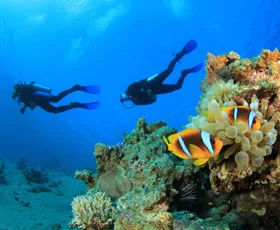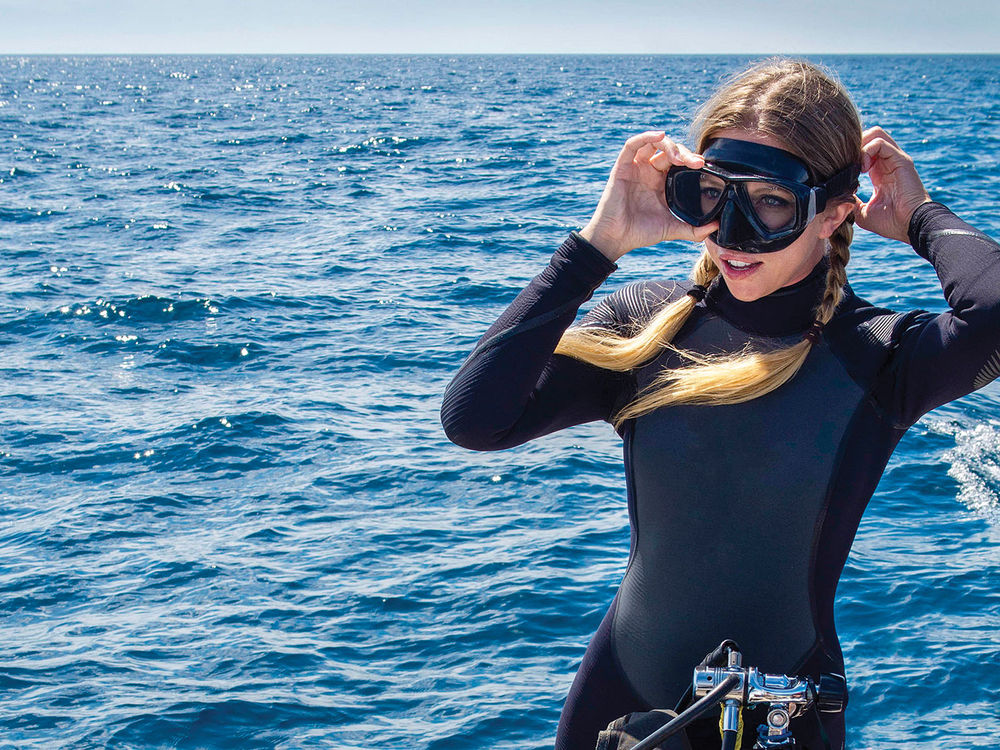How Long do I Have to Wait to Dive After
Giving Birth?
While you of course would have to check with
your doctor, there are some general guidelines for resuming diving after
giving birth. If you had a vaginal delivery, it is recommended that
you wait at least 4 weeks before resuming diving. If you had a cesarean
delivery, it is advised that you wait at least 8 weeks before you hit
the water again.
Of course, these are only rough rules of
thumb, it is different for every women depending on the circumstances
of her delivery and health. Always check with your doctor before resuming
diving.
Diving and Menstruation:
Can You Dive While Menstruating? And are Sharks Really Coming?
First the question of diving while menstruating.
First, there really is no conclusive evidence to state that women divers
are at increased risk of DCI during their period.
However, some studies suggest that women
may be at increased risk during the first week of their cycle. These
studies weren't conducted on open water divers but rather within the
aerospace industry and for medical hyperbaric therapy.
Some studies also suggest, but do not prove,
that women taking oral contraceptives are at an increased risk for DCI.
So what is the conclusion?
Divers Alert Network (DAN) advises that menstruating
women may want to dive more conservatively - especially if they are
taking oral contraceptives. This could consist of longer safety stops,
shallower dives, short dives and/or fewer dives.
Personally, I have never altered my diving
patterns during my monthly cycle and have never had a problem. But everyone
is different and it wouldn't hurt to be a bit more conservative during
your menstrual period.
Sharks and Menstruation:
Diving and menstruation poses another area
of concern for woman.
Many women are worried about shark attacks
during menstruation. That is, that sharks will be attracted by the scent
of their blood and put them at increased risk of attack.About shark
attacks during
First, rest assured, that there is no evidence
that women are at an increased risk for shark attacks if they are menstruating.
That is not to say that the sharks can't
smell the menstrual blood. They probably most certainly can. This is
despite the fact that the amount of blood is small and spread over several
days. Sharks have an extraordinary sense of smell. However, according
to DAN, many shark species are not attracted to this type of blood.s
Again, there is no conclusive evidence suggesting
an increased risk of sharks attacks during your period. However, even
if there were, it appears it would be very small. The risk of a shark
attack anyway is extremely small and does not appear to increase significantly
during your cycle. So I wouldn't worry too much about it.Personally,
I have seen alot of sharks during my dives and have had no problems
with them, whether it was during my monthly cycle or not. I wouldn't
let this concern affect your diving habits.
Scuba Diving and Breast
Implants:
Happily, the short and sweet answer is "yes
- you can dive with breast implants." Of course, this is after you have
recovered from the surgery and have gotten the go-ahead from your doctor.
While there has not been alot of scientific research on the subject,
one study was done in a hyperbaric chamber at Duke University. Silicone,
saline and silicone/saline implants were placed in the chamber and subjected
to various depth and duration profiles. The result was that there was
a 1-4% increase in bubble size which is considered to be insignificant.
The saline implants absorbed less nitrogen than the silicone since nitrogen
is more soluble in silicone than in saline. Any gas bubbles which formed
in the implants did not lead to any rupture and eventually dissipated
over time. The study did not include any implants which were actually
in a person.
Buoyancy and Other Considerations One thing
you will have to account for when scuba diving with breast implants
is the issue of buoyancy. If you have saline implants, they are neutrally
buoyant so it won't affect your weighting when you dive. However, silicone
implants are heavier than water so they will affect your buoyancy when
you dive. The bigger they are, the more your buoyancy will be affected.
Given this, you might want to do a checkout dive when you first return
to the water so you can find the required amount of weight for your
new figure. You will also want to check out your wetsuit and BC to make
sure they will still fit properly without putting alot of pressure on
your chest.




